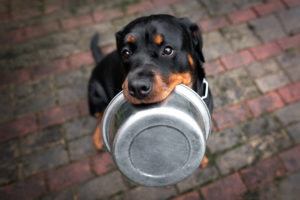Your pet’s food is an important factor in their health and wellbeing. This is something you need to be conscious of when you initially add a new member to the family, but also as your pet ages. Take it from some of the best Philly veterinarians, just like people, our pets need to be on a balanced diet with nutrients and vitamins for a healthy immune system and to help vital organs work efficiently. The amount of food given each meal is also important, as each individual pet might need more or less during meals, and pacing is everything!
When choosing food for your pet, you can consult with your veterinarian on which type and texture is best suited for your furry friend. You can also research brands and types of food that are beneficial specifically to the breed of cat or dog. Depending on medical conditions, age and specific needs regarding nutrients and vitamins, your vet can recommend a soft or dry option. Switching your pet from puppy food to adult food can also be an adjustment and should be done gradually. When food is switched, whether from puppy to adult, dry to wet food, or changing from one brand to another, our pets can experience gastrointestinal distress including vomiting or diarrhea. As you begin to make the change, gradually add in the new food to the old food over a period of time, in order to ease the transition for your pet’s stomach. Generally, switching from puppy food to adult food happens around 1 year of age. Transitioning from adult food to a more specific “senior” food usually occurs around 7 years for smaller breeds and 5-6 years of age for larger breeds. As your dog ages, they may develop conditions that call for a more specific type of food. Your pet may also need food that supports dental health.
As life is always unpredictable, and we are all very busy with work, hobbies, and our families, sometimes we may run out of food for our friends! Do not panic, there is a simple and quick solution. This is meant to be a quick fix, not a long-term solution and your pet should be eating their dog or cat food as soon as you have the opportunity to go to the store. Allowing your pet to eat something bland will not only satisfy their stomach during meal time, but it can also be rich in protein and other importance nutrients your pet needs daily. Boiled chicken and white rice (50/50) will provide your pet with a nice meal, without leading to any health complications or irritation to their stomach. You always want to stay away from foods that have a lot of spices, processed foods, and foods that are toxic to pets. Examples of foods that are unsafe for pets, specifically dogs, include: chocolate, grapes, avocado, garlic, onions, and alcoholic beverages. If your pet shows any signs of distress after a meal or if your pet ingests something possibly dangerous to them and you are looking for a vet in Northern Liberties, Fishtown, or in the general Philadelphia area, please get in touch with us immediately.
Indy Vet Care is here to help your furry friends stay happy and healthy and we provide thorough and comprehensive care to pets of all ages! Get in touch with our veterinarians for routine checkups, neutering or spaying services, nutritional guidance or dog or cat vaccinations in Philadelphia.

